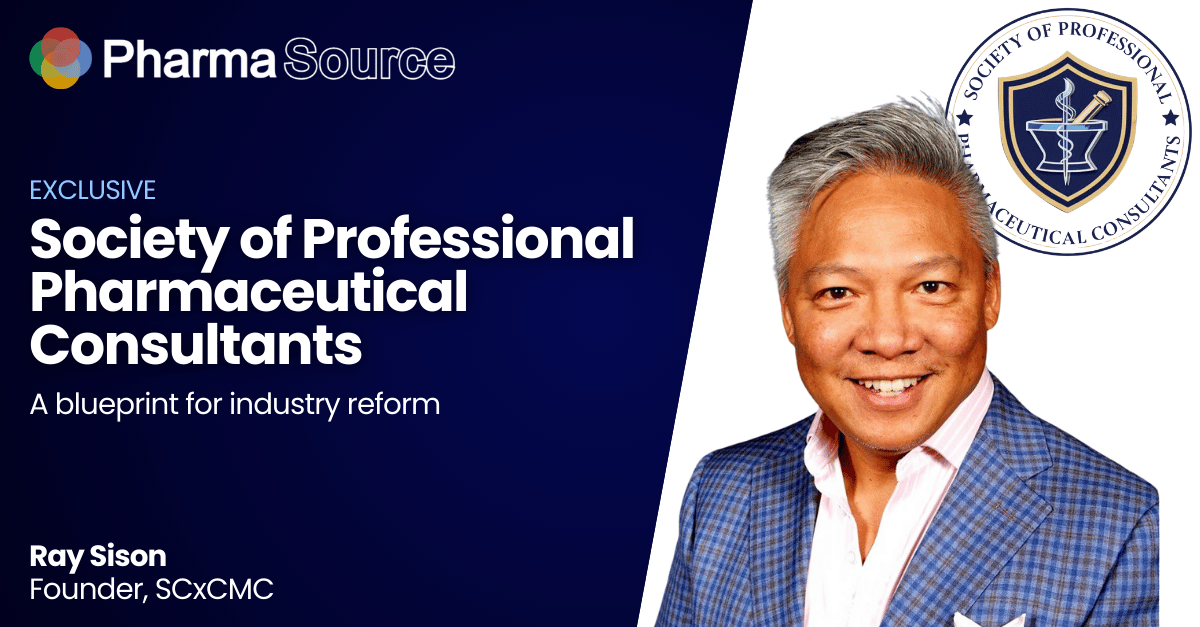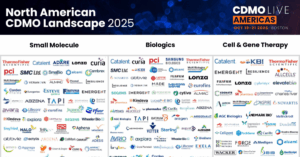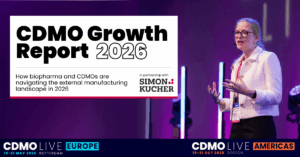“In pharmaceutical consulting everybody’s just doing their own thing. It’s the Wild West compared to what it should be.” – Ray Sison
Ray Sison, founder of SCxCMC exclusively speaks to the PharmaSource podcast about the launch of the Society of Professional Pharmaceutical Consultants (SOPPhC)
In the latest PharmaSource podcast episode, Ray explains why he believes the pharmaceutical consulting industry desperately needs professional standards, ethical guidelines, and professional trade organization to better serve biotech clients and create sustainable working conditions for consultants. He announces how the new society is designed to address these critical industry gaps:
The Unregulated Pharma Consulting Landscape
The pharmaceutical consulting landscape operates without formal standards, professional oversight, or industry data. This unregulated environment creates challenges for both consultants and their clients.
“There is currently no definition. Anybody could be a consultant. You just go out there, hang a shingle and off you go. This has led to a flexible, vibrant workforce, but there are trade offs we need to discuss”
Despite the industry’s reliance on highly educated professionals across the workforce spectrum, this lack of structure creates significant challenges.
Ray highlights the data vacuum: “I do not believe that any data exists on pharmaceutical consulting as an employment sector. I don’t believe anyone could tell us you how many people are calling themselves pharmaceutical consultants, what we’re getting paid, or how many are incorporated versus independent.”
The Referral Fee Crisis: Ethical Conflicts in CDMO Relationships
The industry’s most pressing ethical challenge centres on referral fees that create conflicts of interest between consultants, CDMOs, and biotech clients.
“Either you are a consultant or you’re a business broker,” Ray emphasises, highlighting the fundamental distinction many professionals fail to make. The problem arises when consultants accept payments from both sides of a transaction.
Ray explains the ethical dilemma: “If I am being paid by my clients, I represent them. I am part of their organisation because they’re paying my bills. Is it right for me to accept referral fees from CDMOs?”
The financial stakes are significant. Ray notes that when he worked in business development for CDMOs, “you could get commissions of 2 to 3%” on top of six-figure base salaries. With pharmaceutical contracts ranging from $500,000 to multi-million dollar deals, these referral fees represent substantial sums that can compromise objective advice.
Ray’s proposed solution: Working through a professional trade organization, standard referral fees could be negotiated with participating CDMOs for its members. However, the referral fee would accrue to the client purchasing the service, not directly to the consultant.
This approach ensures transparency: the client benefits from hiring a member consultant, the CDMO gains the opportunity to offer a cost incentive, and the consultant becomes more competitive compared to non-member consultants. The consultant could also negotiate a split of any discounts or use the arrangement to justify a higher rate.
Financial Risk: Consultants Bearing Biotech’s Cash Flow Problems
Consultants frequently shoulder inappropriate risk when working with cash-strapped biotech companies led by inexperienced teams, creating unsustainable working conditions that demand industry-wide solutions.
Ray believes risk-sharing belongs elsewhere: “The assumption should be that if you want to share risk, you hire employees and grant stock options. Consultants understand they are not eligible for benefits, have no employee rights, and can be terminated at any time. In exchange, they should expect timely payment.”
Many consultants get burned in the process. Product failed? Clients claim they only pay for success. Low on cash? Non-essential personnel are cut, and consultants are the first to go. Money owed? Often ghosted. “We need to agree on fair practices, business terms, and risk-sharing only when it is appropriate and explicitly agreed upon,” Ray states plainly.
Ray stresses that risk-sharing contradicts fundamental consulting principles: “The whole point of consulting is that I’m not taking on the risk. Consultants go out there, they do their job, they file their invoices, and they get paid. Generally speaking, it’s fee-for-service.”
There is currently no accreditation process for consultants, and many biotech clients may rightly complain about the quality of the workforce and their output. “Until we begin setting standards and ethical practices, companies have limited information when making hiring decisions,” Ray observes.
The Society of Professional Pharmaceutical Consultants: A Blueprint for Industry Reform
Ray’s solution to these systemic problems is the Society of Professional Pharmaceutical Consultants (SOPPhC, pronounced “SAH-fik”), a non-profit organisation established to professionalise the pharma consulting industry.
The organisation will focus on three key areas: “A professional organisation will allow us to define the profession, educate its members, and advocate strength through numbers.”
Three pillars of SOPPhC:
1. Professional Definition & Standards “The idea of a professional organisation will give us the opportunity to define the profession and a legitimate career path for advancement.” This includes developing certification processes and ethical guidelines that currently don’t exist.
2. Education & Business Development “How do you start a business? How do you survive and thrive as a consultant? How do you graduate to the next level?” Ray envisions comprehensive support systems and learning opportunities covering everything from business structures to insurance requirements and scaling operations.
3. Advocacy and Negotiation: “Based on best practices and legal review, let’s agree on generally acceptable terms and conditions that every member consultant should include in a consulting services agreement with their clients. In addition, as membership grows, we will be positioned to negotiate group discounts for conferences, training classes, software and services, plus reporting salary/rate surveys for fairer payment terms industry-wide.”
The long-term vision: Transform pharmaceutical consulting from an “overgrown patch of weeds” into a professionalised industry with clear standards, ethical guidelines, and collective representation that benefits both consultants and their biotech clients.
SOPPhC will launch in October 2025. Visit the website at sopphc.org for more information.
Contact Ray Sison: in**@****hc.org










